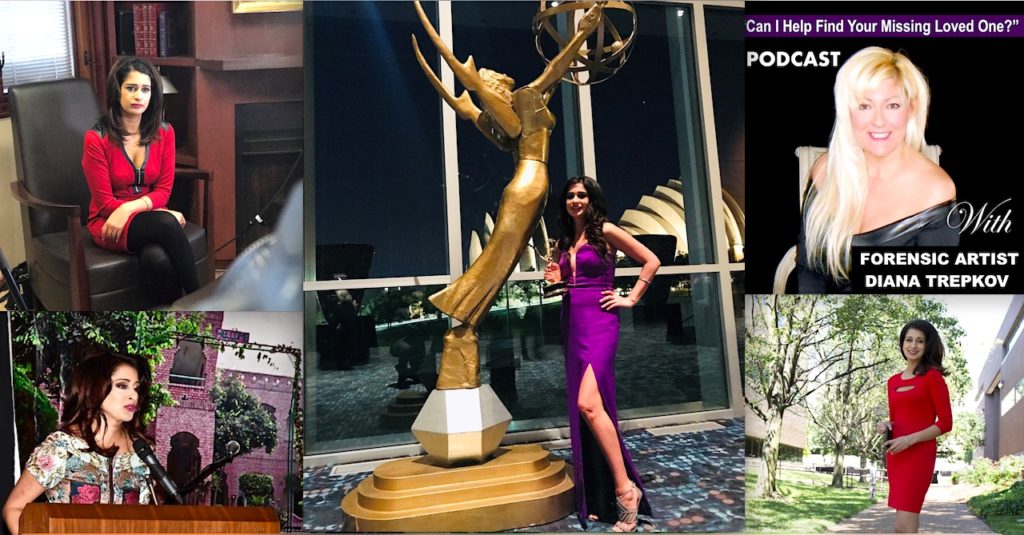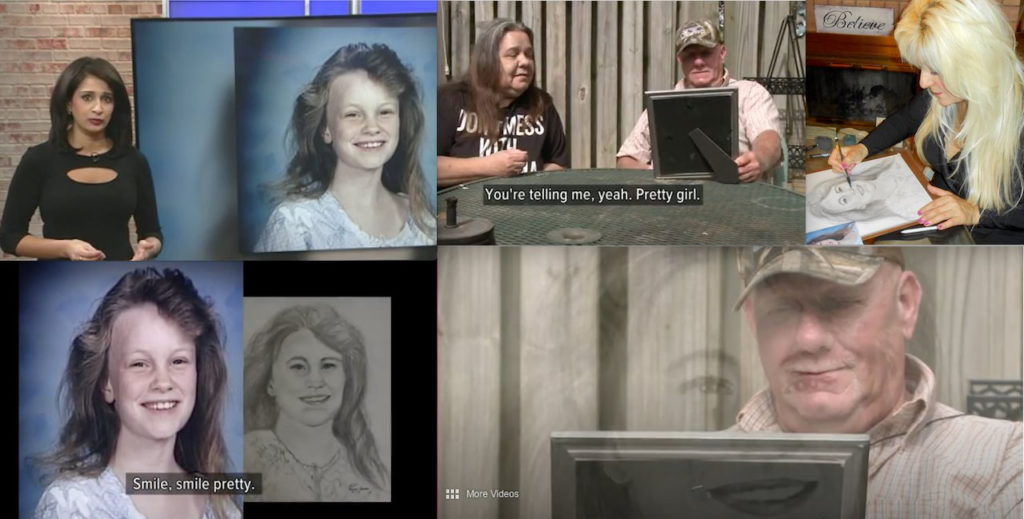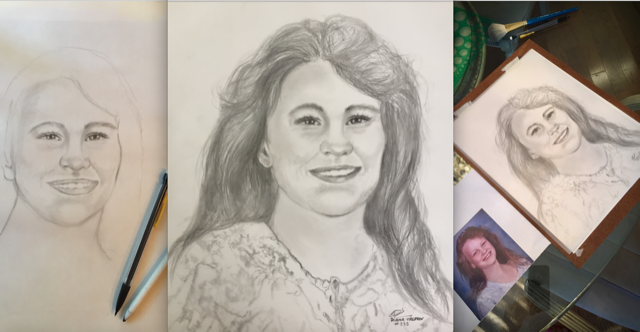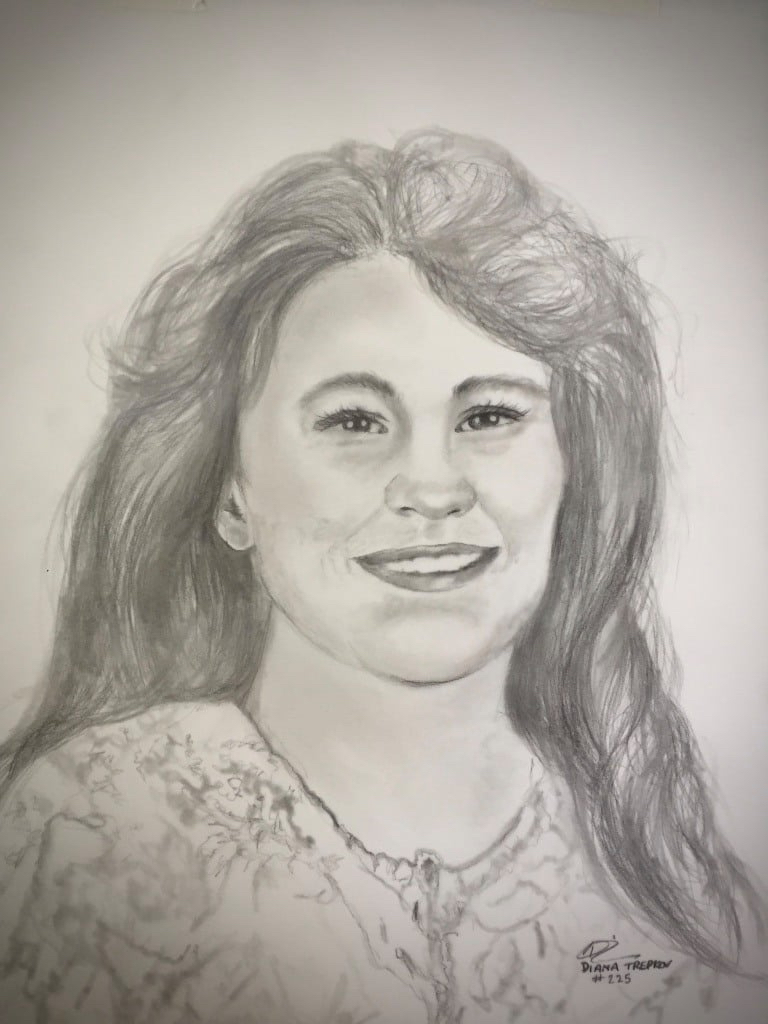
Please click on the link below to listen to this podcast episode.





“Artist sketches portrait of what Angie Housman would look like today for her father”
~A forensic artist’s gift brings the 9-year-old back to life for the side of her family that grieved in private.


A Special Thank You to PJ for taking the time to prepare these Tips for families of missing loved ones!
If your loved one is missing, the local tv news can be the best way to get the word out quickly. One story can help bring someone home. One story could put the heat on investigators to take a harder look at the case. There’s a lot at stake. However, after a decade of working in local news, I am well aware that not all newsworthy stories get coverage. With tight deadlines, breaking news and severe weather- sometimes it can be hard to get the attention of local media. I hope the following tips offer some help. It may seem like a lot of hoops to jump through during an already difficult time. Ideally, one call or email (or a press release from Police) would be enough to get the media’s attention. But for a number of factors I describe below, that’s not always the case.
How to contact local TV media
Getting attention to your case is crucial, but knowing who to contact and how to get their attention can be difficult. In the case of local television, each station should have its own web page. The quickest way to find email addresses for reporters or anchors is to go to the ‘contact us’ or ‘meet the team’ section of the web page. Email addresses and often social media accounts can be found under the reporter/anchor biographies. You can also just search for the station on facebook and send a message that way.
Apart from emailing reporters or anchors directly, you can also look for the general “news” or “assignment” desk phone number or tip line email. This can usually be found on a ‘contact us’ page on the website, or sometimes its shown during the newscasts. These emails generally look something like newstips@ksdk.com for example. These emails go directly to Assignment Editors. Their job is to make sure the “news of the day” is covered. If they feel the tip is “newsworthy”, you could hear from them before you hear from a reporter/anchor.
**Note about news anchors. In some larger cities, news anchors aren’t going to be the ones who are working on daily news stories. They may be the most recognizable face with the biggest community presence, but they usually forward story tips to reporters. They get so many emails, sometimes story tips never make it out of their inbox. Don’t count on them alone. Cast a wide net.
How to get local TV coverage for your missing loved one
As someone who gets a lot of tips/emails from the public, I can tell you having the following information in an email/call/tip increases the chances of coverage by at least 50%:
-Cell Phone Number- this is crucial. TV news people work on tight deadlines. They need to know they’ll be able to get a hold of you or a family spokesperson (someone who is willing to go on camera on short notice) if they decide to pursue your case for a story that day or in the future.
On a sad note, there have been some missing persons or murder cases where we could not find any family who was willing to speak up on behalf of their loved one. Those cases, unfortunately, often don’t get much attention. Remember- tv news is a visual medium. We need people to speak to us. Ideally in person.
-Short synopsis of what has happened. In a few short sentences, let them know who is missing, their age, where they were last seen, where they’re from and most importantly- WHO IS THIS PERSON? Is it a 20 year old woman? A 45 year old father? Other details help too. Are they a student? A homemaker? Retired? Here’s an example of the type of email that would get the attention of a local tv station: “My 21 year old niece has been missing for seven days. She was last seen leaving work at ABC company Monday night. We are so worried! Police are investigating. We are desperate to get the word out.
She has a 2 year old baby at home and this isn’t like her. She volunteers (..list hobbies, or other community organizations the missing loved one may be affiliated with). Our family/Her mother/I would be available to do an interview at any time. Please contact me at: xxx-xxx-xxxx. Here are some pictures of her. Can you please help us get the word out about this?”
-Always include pictures. As previously mentioned, tv news is a visual medium. The more pictures, the better. You have to show people that this is a person who is loved! This could be their loved one! Pictures drive that point home.
-Follow up! Local news can be somewhat fast paced, depending on where you live. Your email or call might’ve gotten lost in the shuffle of breaking news, or severe weather. If you don’t receive a response, or you receive something generic, don’t let that stop you from trying again…and again…and again! This is where the persistence of family can really pay off. Sometimes you just need to reach the right person who advocates for your story. We all work different shifts, so don’t hesitate to call back or send a follow up email the next day. I can think of several examples where a story has fallen through for the 6pm news, and reporters are simply looking for something they can put together easily. If they have your contact number and know you want to talk- you’re more likely to get a call and get on the news.
**I personally think ALL missing persons cases should get attention. Unfortunately, I know that does not happen. Some of the points in this article may sound harsh, but it is based on my 10+ years of experience in tv news. Once you know the system, you can use it to improve your odds of getting the coverage you deserve.
Special Note about Cold Cases
Admittedly, it can be harder to get coverage for cold cases. Most tv stations will cover anniversaries or vigils. But there are ways you can try to get more out of local tv media if your case is older and stalled. -Contact tv reporters/anchors who are new/newer to the area. Some of the tv people who’ve been around a while may think there’s nothing new about your case. They think they’ve heard it all before, perhaps. However, for a new reporter, it may capture their interest. They may also be trying to make a name for themselves, so they’re eager to find something new about your case. Play into their self interest and it could work to your benefit.
I have a personal example I can share about this. When I started at my current station, I heard about a terrible unsolved murder case. It had received extensive coverage in the past, but hadn’t had any new developments in years. The anniversary of the murder came up, and I decided to try and find something new about the case that would put it back in the spotlight and renew interest. So much time had passed, that I ended up obtaining investigative case documents that had never been released to the public. After establishing a good relationship with the family, I eventually interviewed the victim’s father- who had never spoken publicly before. I tracked down other people who were close to the victim or had been interviewed in the past. Some were suspects. All of them had theories about what happened and why the case was never solved. The renewed focus on the case forced the prosecutor to answer questions about why it had been stalled so long. Within a few months, a suspect was finally identified! We continued to report on the story, and eventually other victims of this suspect came forward. The murderer is now behind bars for life and has been charged in other cases since our reporting began.
-Get a second set of eyes. If your case is stalled, it would be worthwhile to enlist a new expert to take a second look. Getting an expert on board, could also peak the interest of local media and possibly the prosecutor/investigators in your case.
As we know, the public appetite for all things ‘True Crime’ is huge. There is a whole TV network (Investigation Discovery) devoted to it. The good news is that makes Forensic Experts more visible to the public. Some of them have very specific specialties, like DNA analysis or chemical analysis. Some are soley devoted to finding missing people. Many work with law enforcement agencies, but some also have their own consulting businesses. I’ve heard of some taking on cases pro-bono. They may be more inclined to do so if there is publicity involved. Find an expert and tell them about your case. Ask them to review whatever evidence there is. This accomplishes several things. It could lead to a new development in the case (most important), and it could put pressure on the prosecutor/investigators to step up their efforts or collaborate with your expert. It would also very likely get the media’s attention. The headline could be something like “National DNA expert finds evidence, clues in missing persons case police overlooked”.
Example from my personal experience: A group of three local women I know were determined to get answers in an unsolved murder case. They didn’t know the victim but it was a brutal crime and they felt personally compelled to keep the investigation going. We knew from police statements 20+ years ago that there was DNA in the case. These women took it upon themselves to find a high profile DNA expert (who also happens to have a show on Investigation Discovery) and ask for her help in re-examining the DNA. She agreed! Ultimately the prosecutor did not allow her access to the evidence. But the renewed attention and added pressure appeared to motivate investigators. A short time later, new DNA analysis by police finally identified a suspect.
How can I trust the media to tell my story?
This is a hard question to answer. The short answer is: communication is key. If there are things you’d like to say about your loved one that you DO NOT want published, make sure to say that you are “speaking off the record”. Be very clear and use that phrase. Journalists are trained to know that “off the record” has a very serious, direct meaning. Anything that follows that statement should not appear in their report.
Also, be as clear as possible about what you want or don’t want included. There may be details about your loved one that aren’t flattering or that you’d rather not have included in coverage. Speak frankly with the journalist about this before you do any type of on-camera interview. Also, put it in writing in an email, so there’s a clear record of your wishes and their acknowledgement. There are limits here. If your missing loved one was wanted for murder, or had a long criminal history, the journalist should let you know whether they plan to mention those things. Chances are- they will. That makes YOUR voice as a family member or loved one all the more important to add. Yes, the missing person may have made mistakes, but they’re still a person who is loved and needs to be found.
One last point here- text and text often. Once you have connected with a journalist about your case, check in with them via text. Reporters are always on the go and can’t often respond to emails or calls right away. Text them updates, text them questions, text them potential story ideas about your loved one. Is there a vigil coming up? Did police fail to question a prime suspect? A good reporter can press police for updates and question their investigative tactics if necessary. If we keep questioning the police, they generally give us an answer. It’s not always what we want to hear, but it may be more than what the family is being told.
Please feel free to contact me for more information. PJRandhawa@Live.com
